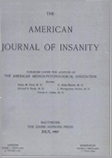SIGNIFICANCE OF BLOOD GROUPS IN INOCULATION MALARIA
Abstract
Laboratory evidence of injury to the plasmodium through mutilation of its erythrocyte host by incompatible serum may be readily demonstrated. In inoculation, when a number of parasites are disseminated from erythrocytes and their development thus disturbed, clinical results may appear as toxic phenomena, in a prolongation of incubation time—and, to a lesser degree—a frequency of tertian and mixed types of fever. Conversely, by the use of compatible blood in intravenous inoculation, there appears almost a stimulation to speeding up of plasmodial development reflected clinically by short incubation time and malignant and quotidian fever types.
Clinical application of these concepts through donor selection varies between choice of a quickly appearing and possibly over-whelming infection, which may be controlled by judicious observation and intravenous quinine, and the selection of a slower developing type of less extreme fever. The latter utilizes incompatible donor blood which carries a minimal probability of embolic sequelæ.
We may state that clinically similar results might be attained either by a stated amount of compatible blood or by the use of a larger dosage of incompatible blood. But large amounts of the latter may result in alarming symptoms which are difficult of control.
Compatible donor blood also provides a better chance of over-coming relative immunity in cases previously treated with malaria; and its use guards against extended periods of incubation.
The selection of incompatible blood apparently does not influence absolute failure of infection, and its effect on the entity known as primary fever has not appeared important.
Despite the fact that blood type is an important individual constitutional factor and the possibility that it may play some role in immunity, there is no evidence sufficiently marked to state there is any relationship between blood type and clinical improvement following malarial therapy.
Access content
To read the fulltext, please use one of the options below to sign in or purchase access.- Personal login
- Institutional Login
- Sign in via OpenAthens
- Register for access
-
Please login/register if you wish to pair your device and check access availability.
Not a subscriber?
PsychiatryOnline subscription options offer access to the DSM-5 library, books, journals, CME, and patient resources. This all-in-one virtual library provides psychiatrists and mental health professionals with key resources for diagnosis, treatment, research, and professional development.
Need more help? PsychiatryOnline Customer Service may be reached by emailing [email protected] or by calling 800-368-5777 (in the U.S.) or 703-907-7322 (outside the U.S.).



